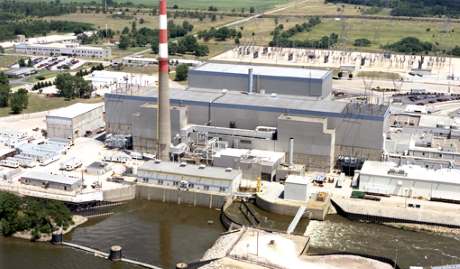This story has been updated to include approval of the bill by the House Energy Committee.
Legislation including steps that would help to preserve Illinois' at-risk nuclear power plants while creating jobs, strengthening the economy, and accelerating renewable energy development has been introduced in the state's General Assembly. The bill has been passed by the General Assembly’s House Energy Committee.
 |
| Quad Cities (Image: Exelon) |
The Future Energy Jobs Bill - Senate Bill 2814 - features the establishment of a Zero Emission Standard (ZES) that would recognise the value of zero emission energy and prevent the premature closure of nuclear plants. It also strengthens and expands the state's Renewable Portfolio Standard to ensure stable, predictable funding for renewable energy, and doubles energy efficiency programs.
Yesterday, the General Assembly’s House Energy Committee passed the bill by a vote of 9 to 1, on the condition that an amended bill is to be brought back to the committee for further action during the session week that runs from 29 November to 1 December.
Exelon Generation and ComEd described the bill as an "important next step" towards passing "urgently needed comprehensive energy legislation".
"The legislation reflects a diverse set of interests, as well as agreement in important areas among environmentalists, consumer advocates, community leaders and energy companies who have worked over the last year-and-a-half to bring together multiple previously introduced bills," the companies said in a joint statement.
Exelon announced earlier this year that its Clinton power plant would close in June 2017 and the two-unit Quad Cities plant a year later, unless legislative action is taken to help secure their future operation. The units have made a combined loss of $800 million over the past seven years, despite being two of the utility's best-performing plants. Exelon has already said that the "drop dead" date after which it would be unable to reverse its closure decision would be next month. Action on legislation will need to happen during veto sessions being held by the Illinois General Assembly on 15-17 November and 29 November-1 December.
While further changes to the legislation are expected in the days ahead, Exelon said it would be expected to result in a "modest" 25 cent monthly increase on the average ComEd residential customer energy bill. Closure of the nuclear plants would add up to $1.85 per month to the average bill, the companies said.
The short-term nature of deregulated electricity markets, coupled with competition from low-cost gas and federally subsidized wind power, have left some otherwise well-performing US nuclear plants at risk of premature closure for economic reasons. Earlier this year New York became the first state to approved legislation explicitly recognising the zero-carbon contribution of nuclear power plants and helping ensure their continued operation.
Following the New York decision Exelon confirmed it would reinvest about $200 million in its Ginna and Nine Mile Point plants. It also said it would continue negotiations on a potential purchase of Fitzpatrick from Entergy and would refuel the plant, which Entergy had previously announced plans to close, in January 2017.
Exelon's executive vice president for governmental and regulatory affairs and public policy, Joe Dominguez , said the "innovative approach" of the ZES would preserve Illinois' largest source of clean energy. "These plants are the backbone of our energy supply, preventing significant carbon emissions and serving as economic engines for the state and the communities in which they operate," he said.
Fidel Marquez, ComEd's senior vice president, government and external affairs, said the company would continue to work with stakeholders to refine and pass the legislation. "We've listened to and worked with key environmentalists, consumer advocates, and community and faith leaders in developing this legislation, with the shared goal of delivering policy solutions that create innovative pathways to a sustainable future," he said.
Exelon Generation is the largest owner and operator of nuclear capacity in the USA, and ComEd is one of the country's largest utilities. Both are part of the Exelon group of companies.
Researched and written
by World Nuclear News







_94566.jpeg)






